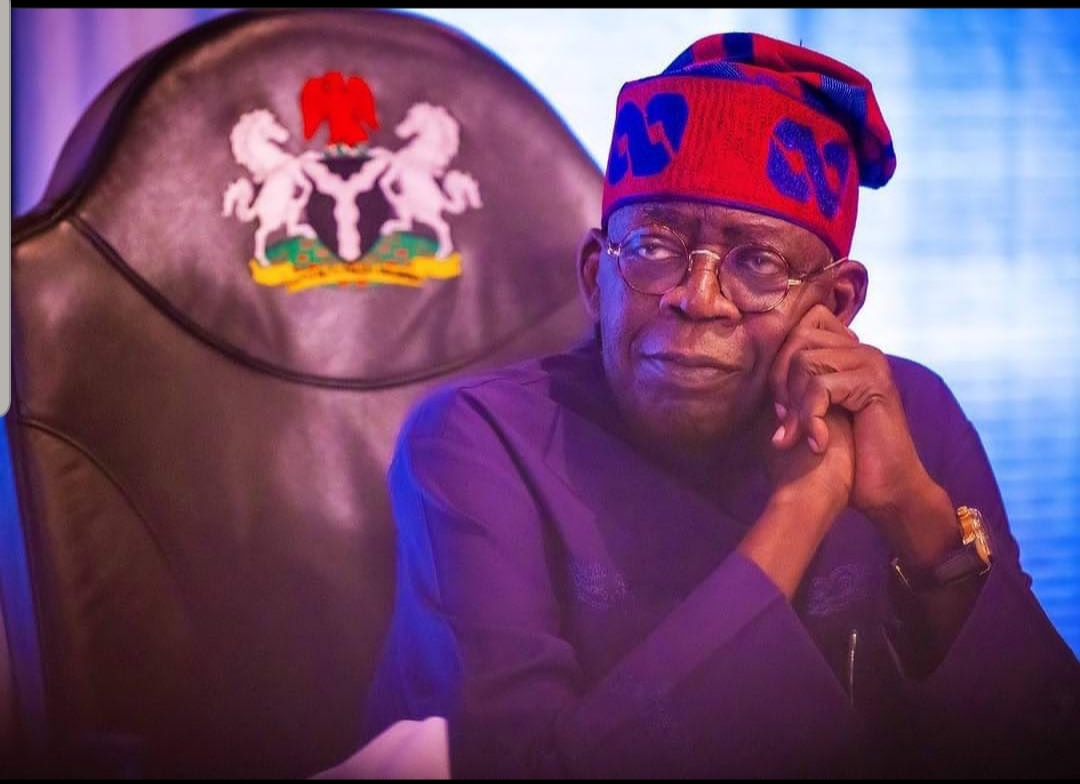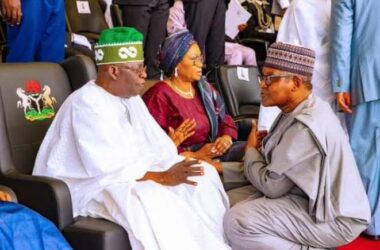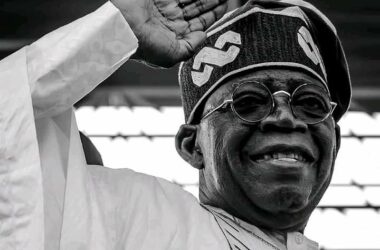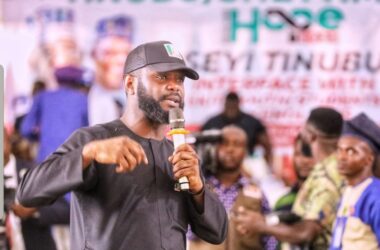“Tinubu Makes Far-Reaching Commitments on Economy, Education & the Environment”.
Six months might seem like a short time in the life of any administration. But as far as the administration of Nigeria’s President Bola Ahmed Tinubu is concerned, it has been an eventful – indeed, rollercoaster – period, not least due to the bold actions the federal government has undertaken since its assumption of office, and the impact these reforms have had on the lives and livelihoods of Nigerians. Since May, the Tinubu administration has seen the swift consideration and passage of the 2023 Supplementary Appropriation Bills and the 2024-2026 Medium Term Expenditure Framework Fiscal Strategy Paper by the National Assembly. In that time he had also sworn in his cabinet, charging it’s members to see Nigeria in terms of a desperately thirsty man trying to draw water from a dry well – and to execute their functions with the sense of urgency that such a situation demands.
Exactly six months to the day of his assumption of office as President, Asiwaju Bola Ahmed Tinubu, on Wednesday, November 29, 2023, presented his government’s first annual budget in anticipation of the fiscal year 2024 to a joint session of the 10th National Assembly in Abuja, the nation’s capital. The proposal, which he called ‘The Budget of Renewed Hope’, would see the government expend the sum of N27.5 trillion over the fiscal year under review, effective from January 1, 2024.
Nobody, not even the President, is under any illusions about this budget: It will face serious headwinds. Growth, for example, will hover around just 3% throughout the coming year – a situation which is compounded by Nigeria’s continued over-reliance on importation. These headwinds include lingering post-COVID supply and production bottlenecks affecting not just Nigeria but many other nations as well. Armed conflict in various parts of the world – most notably in Ukraine and Palestine – are another cause of worry, as well as restrictive monetary policies in the major economies of the world.
Ever the optimist, though, the President noted that in spite of these headwinds, the Nigerian economy has proven to be resilient even in its modest growth. His task, as he saw it, would be to accelerate that growth as best he could.
To do so, President Tinubu stated his aim to tame the rising spectre of inflation by ensure the effective coordination of fiscal and monetary policy measures, and by collaborating with sub-national governments to address the structural factors driving the phenomenon in our country.
The Budget of Renewed Hope, said the President, aims to ensure the following: job-rich economic growth, macro-economic stability, a better investment environment, and enhanced human capital development, as well as poverty reduction and greater access to social security. Concerning defence and internal security, he said the government planned to overhaul the architecture thereof. It would also prioritize human capital development with particular attention to children, whom he called ‘the foundation of the nation’.
The President is confident that if his administration manages to do the following, the Nigerian economy would grow by a minimum of 3.76% (ie slightly above the current global average) by the end of fiscal year 2024:
– improve the effectiveness of budget performance by focusing on ensuring value for money and greater transparency and accountability – in concert with the private sector;
– implement a more sustainable model of funding tertiary education in Nigeria. Funding to the sector, according to the budget proposal, is N2.18tn, which is 101.8% more than the appropriation for the 2023 fiscal year. Of that amount, N1.23tn goes to the Federal Ministry of Education and its agencies; N251.47bn to the Universal Basic, Education Commission; and N700bn to the Tertiary Education Trust Fund (TETFUND); and
– ensure a stable macro-economic environment by implementing business and investment-friendly measures for sustainable growth.
According to the President, the country remains committed to meeting its debt obligations with projected debt servicing at 45% of total expected total revenue. Budget deficit, he disclosed, is projected at N9.18tn in 2024 (ie 3.88 per cent of GDP) – far lower, Nigerians will agree, than the N13.78tn deficit, or 6.11% of GDP, recorded in 2023. The deficit, he added, would be financed by new borrowings totalling N7.83tn on multilateral and bilateral loans secured for specific development projects. It is interesting to note that the non-debt recurrent expenditure is N9.92tn, while debt service is projected to be N8.25tn with capital expenditure at N8.7tn.
Stressing the need to boost tax revenues, Pres. Tinubu said his government’s target was to increase the ratio of revenue to GDP from less than the current 10% to 18% within the administration’s current tenure. This will be ensured, he added, by further containing financial leakages through effective implementation of financial management reforms.
Another highlight of the 2024 budget proposal is the government’s action in adopting a conservative oil price benchmark of $77.96 per barrel and daily oil production estimate of 1.78 million barrels per day in crafting its estimates – as well adopting an official Naira-to-US Dollar exchange rate of N750/$ for 2024.
A breakdown of the projected spending, as provided after Pres. Tinubu’s presentation by the Ministries of Finance and of Budget and National Planning, shows that defence, education and roads will collectively gulp N6.7tn. Funding for the defence and security sectors is N3.25tn, while the health sector gets N1.33tn. And N1.32tn will be expended on the provision of infrastructure in the power, transport, water resources, aviation, works and housing sectors.
Another highlight of the proposal shows that the government intends to lean heavily on public/private partnerships (PPP) as well as the sale of loss-making assets – as opposed to Nigeria’s past fatal attraction to potentially crippling loans – to finance some of its infrastructure targets. The administration, the relevant ministries disclosed, is eyeing N10.4tn from tax, dividends and others instead.
Widespread and SHARED economic success, the President insisted, was the ultimate goal here – hence the renewed focus by his administration on the review of national social investment programs to enhance their implementation and effectiveness. “In particular,” he added in this regard, “the National Social Safety Net Project will be expanded to provide targeted cash transfers to poor and vulnerable households.”
In a nod to a current global conversation that coincided with his budget presentation (and to which Nigeria has repeatedly weighed in at every opportunity), the President disclosed that a major motivation on the back of the minds of those who crafted the 2024 budget was the quest to balance the need for accelerated and sustainable economic development WITH the need to protect the environment and mitigate the effects of climate change. To this end, he said, his government was demonstrating its commitment to a greener future by making provisions to leverage private capital for big-ticket infrastructure projects in energy, transportation and other sectors. “This,” he stressed, “marks a critical step towards diversifying our energy mix, enhancing efficiency, and fostering the development of renewable energy sources.”
Before flying out to Dubai in the United Arab Emirates to join other world leaders at the 28th UN Climate Summit (also known as the Conference of the Parties, or COP28 Climate Summit, an event which he had described in his budget presentation as ‘a pivotal moment for global climate action‘), the President directed relevant MDAs of government to double their efforts towards securing funding commitments aimed at bolstering Nigeria’s energy transition – reason being that there was no better time than now to attract international partnerships and investments that align with Nigeria’s developmental goals. “Together,” he said, “we will strive for Nigeria to emerge from COP 28 with tangible commitments, reinforcing our dedication to a future where energy is not only a catalyst for development but also a driver of environmental stewardship.”
Upon their arrival in the oil-rich Emirate, the President and his entourage found themselves engaged in an urgent and robust conversation centered around 3 F words: Fossil Fuels and FINANCE. Urgent, because 2023 has been the hottest year on record, according to scientific findings, and the impacts of climate change have been more extreme and widespread than ever. Also, geopolitical events such as the wars in Ukraine and Palestine have exposed tensions between the global North and South, developed and developing nations, and between fossil fuel and clean energy.
It was a dichotomy which the COP 28 President, the UAE’s Prince Sultan Al Jaber put in clear perspective in his Welcome Address, when he called for a ‘tripling of renewable energy capacity, (by which he meant a 200% increase in the world’s renewable energy capacity by the end of this decade in 2029) and a doubling of energy efficiency to cut emissions’.
The Nigerian leader and his team were keenly aware of the fraught nature of these negotiations – especially those regarding finance and compensation for environmental damage, which has been a hugely divisive issue between developed and developing countries. This back-and-forth has been the norm at COP Summits since the first one, which was held in 1995 in the German city of Munich.
One thing all parties can agree on, though: the bottom line (and the true test of the success or otherwise of COP 28, which ends on December 12, 2023) remains the ability of the participants to make meaningful progress on phasing out fossil fuels and raising enough climate finance to slash emissions, to adapt effectively and acknowledge responsibility for rising temperatures and the havoc they are causing.
In the spirit of COP 28, the Tinubu Administration has taken what has been described as a significant step towards a sustainable and eco-friendly future by introducing a pioneering initiative to deploy a fleet of 100 electric buses. President Tinubu disclosed this at a high-level meeting with stakeholders and investors on the Nigeria Carbon Market and Electric Buses Rollout Programme in Dubai, on the margins of the Summit.
According to a comprehensive press statement released by the Special Adviser to the President on Media and Publicity, Chief Ajuri Ngelale, the President explained that the strategic initiative was aimed at significantly reducing Nigeria’s carbon footprint and modernizing the country’s transportation systems as part of a larger effort to position the country and Africa as a pioneering frontier of green manufacturing and industrialization, with a focus on natural gas as a transition fuel alongside other renewable energy sources.
To spearhead this transformative plan, Ngelale said, Tinubu announced the appointment of the Executive Chairman of the Federal Inland Revenue Service (FIRS), Mr. Zacch Adedeji, and the Director-General of the National Council on Climate Change (NCCC), Mr. Dahiru Salisu, to co-chair the Nigeria Carbon Market Activation Plan.
The President assured prospective investors that this initiative transcends being a mere pilot project, calling it a concrete manifestation of Nigeria’s unwavering dedication to a carbon-neutral future. “I assure you,” he said, “this is only the commencement of our ambitious plans, with many more impactful initiatives on the horizon.”.
Taken together, President Tinubu’s commitments – at his budget presentation in Abuja and at the COP 28 Climate Summit in Dubai – represent a determination on his part to ensure a wholesome template of development for Nigeria and her people that does not sacrifice long-term prosperity and security on the altar of present exigencies and immediate gratification. Also, as with previous engagements, COP 28 presented him with yet another opportunity to point the rest of the world in the direction of Nigeria by highlighting one more area (in this case, environmental sustainability) in which the international community – geopolitical and business alike – can invest profitability and safely in a win-win scenario, not just for the parties involved, but for our common home, the Blue Planet, as well.
Considering the aforementioned headwinds that are sure to confront the 2024 budget and Pres. Tinubu’s other commitments in the last one week, however, there has been no shortage of criticism (or at best, words of counsel) from stakeholders ranging from opposition parties to accountability watchdogs such as the tech group, BudgIT, all of whom have weighed in on the subject in some fashion.
Perhaps the one recurring theme in the interventions of these stakeholders borders on the vexed issue of the cost of governance and the need (nay, the urgent imperative) to cut it to manageable levels to reflect the times and the condition of the masses. It is in this wise that many have taken issue with the size of President Tinubu’s entourage to the climate gathering in the UAE – numbering a whopping 422 individuals! This, in the opinion of many concerned Nigerians, flies in the face of our present reality, and sends the wrong message to both the Nigerian people and the international community, including Nigeria’s creditors, from whom we’re never tired of seeking debt relief.
True, the Tinubu reforms are beginning to gain some macroeconomic traction – as far the stock market, the country’s GDP, oil production, and balance of trade are concerned. Also, the decision to put one of the presidential jets up for sale is a step in the right direction.
But … these macroeconomic benefits are just that, macro. They exist on paper. As far as the man on the street is concerned, the only indices that matter are those that translate into more money in his pocket, affordable food, shelter and healthcare, and generally better career and life prospects, going forward. So when he sees his leaders tell him to brace up for hard times, and to be ready to make sacrifices – only to see said leaders exhibit blatant ostentation in the way they go about the business of state, what is he supposed to think? How is he to respond?
The same goes for those who do business with Nigeria – either as investors or as creditors. It is said that perception is everything. What perception is a government that is proposing, for example, to expend the whopping sum of ₦15 billion on a makeover of the Vice-President’s residence trying to promote? Isn’t that a negation of the principle behind the aforementioned plan to sell the presidential jet? Whatever the rationale behind moves like this, it must be discarded forthwith. Instead, the money could be directed towards boosting the government’s student loan scheme; the sum of N10bn earmarked for it is pitifully low – and it is of infinitely greater importance than sprucing up one man’s house.
It is time for our leaders to make our federal budgets and projections more impactful in the lives of our people by making sure that ‘cutting the cost of governance’ is no mere slogan – but a deliberate policy and plan of action.
I






